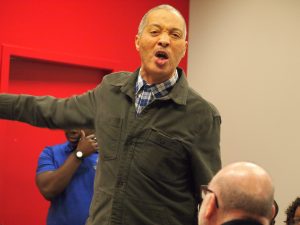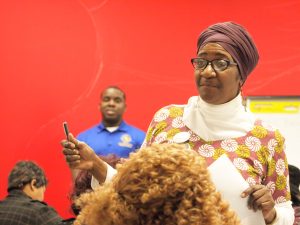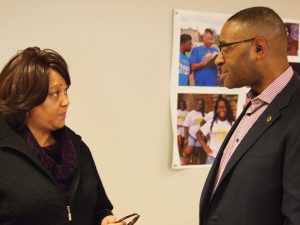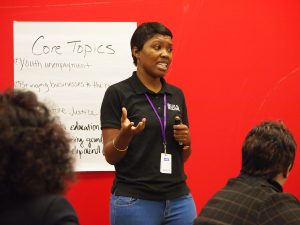Push made for funds to fight gun violence in city
By Kevin Beese Staff reporter — January 30, 2018
Otis Chandler Monroe III, CEO of The Monroe Foundation, angrily tells community residents that Chase, which closed its branch in Chicago’s Austin neighborhood, should give $1 million to each of the eight neighborhoods on Cook County Commissioner Richard Boykin’s recent Endangered Communities Tour. Monroe said even though Chase has committed $100 million to impoverished communities, the money is not going where it truly is needed. (Photo by Kevin Beese/Chronicle Media)
Cook County Commissioner Richard Boykin this week will introduce legislation seeking to have gun violence in Chicago designated a public health epidemic.
Such a designation, the commissioner noted, would get more resources allocated to address the problem.
“We need to act,” Boykin told the Chronicle in discussing his planned legislative efforts. “It is critical that we take the message to the masses. What we have been doing is not working.”
The commissioner said he does not have a set dollar amount in mind for additional allocations for curbing gun violence in the city. He said he just knows that more money has to be freed up to get the city’s gun violence under control.
“We have the Justice Advisory Council money (millions in county dollars used for grants to organizations combating violence). It is not enough,” Boykin said. “I expect us to get more (through the public health epidemic designation).”

Phyllis Duncan, founder of Mothers of Murdered Sons, talks with community leaders about the need to pool resources. (Photo by Kevin Beese/Chronicle Media)
He hopes the public health epidemic designation can free up county, state and national funds to help community providers turn the tide on violence.
Boykin said the bloody weekends in Chicago have to come to a stop.
“They say the numbers are down. Where? I’m not seeing it, not in the black and brown communities. There were 11 people shot Friday, two fatally.” Boykin said. “I have to ask ‘What are we doing?’”
He said part of reason violence continues on the streets of the city is because today’s youth have not been taught conflict-resolution skills. When conflicts arise, the commissioner said, emotions rise and youth aren’t able to handle those emotions in a peaceful manner.
“We have got to help these communities,” Boykin said. “My first priority is addressing the community epidemic of gun violence.”

County Cook Commissioner Richard Boykin talks with Rosalyn Tucker, a longtime resident of Chicago’s Austin neighborhood following a meeting Saturday focusing on priorities for the First District. Boykin said he plans to get gun violence in Chicago declared a public health emergency. (Photo by Kevin Beese/Chronicle Media)
Boykin said he hopes to officially present his public health epidemic proposal to his County Board peers Feb. 7.
“I would hope that we could partner with violence-prevention organizations,” Boykin said.
Bertha Pernell lost her son, Maurice, to gun violence in June. She was frustrated with a lack of response from police and elected officials when she asked questions about her son’s death and apprehension of his killer.
She initially filed to run against Boykin for his 1st District seat as her anger about her son’s murder not being solved grew.
After some soul-searching, she said, she realized politics was not for her. She now chairs the commissioner’s Criminal Justice Advisory Task Force.
“All families experience the same loss,” she said of her efforts to help families affected by gun violence.”
A nurse, Pernell said she has worked just two months since her son was killed.

Iesha Hollins of BUILD leads a discussion on action steps to improving conditions for youth in struggling areas of Cook County. BUILD specializes in gang intervention, prevention and youth programs for nearly 3,000 teens in the Chicago area. (Photo by Kevin Beese/Chronicle Media)
“We need to be strong. We need to be in the communities,” Pernell said.
An idea that she and Boykin are working to make happen is a camp this summer at a Cook County forest preserve for children affected by gun violence.
Pernell noted that many grandparents are raising their grandchildren and that those grandparents could use support from the county or nonprofit agencies.
“Let’s start bringing the change,” Pernell said Saturday at a session aimed at helping Boykin target priorities for the 1st District. “We have to save our children.”
Kouri Marshall, Boykin’s chief of staff, said the turf battle for Chicago streets between gangs has to end.
“They are killing themselves over property they have no ownership of,” Marshall said.
Rosalyn Tucker has lived in Chicago’s Austin neighborhood for 42 years. She said parent and resident involvement is vital to turning things around.
“In my neighborhood, they call me ‘911’ because if I see something I am going to stop it or report it,” she said.
Tucker said she has no problem approaching teens once the school day has started and asking them why they aren’t in school.
“A young man will be selling drugs and not going to school until 9:30. I will go up to him and tell him he can’t do that on my block,” Tucker said.
She said it is wrong when neighborhood residents are afraid to open their door or sit on their back porch.
“It has to start with parenting,” Tucker said.
—- Push made for funds to fight gun violence in city —-






